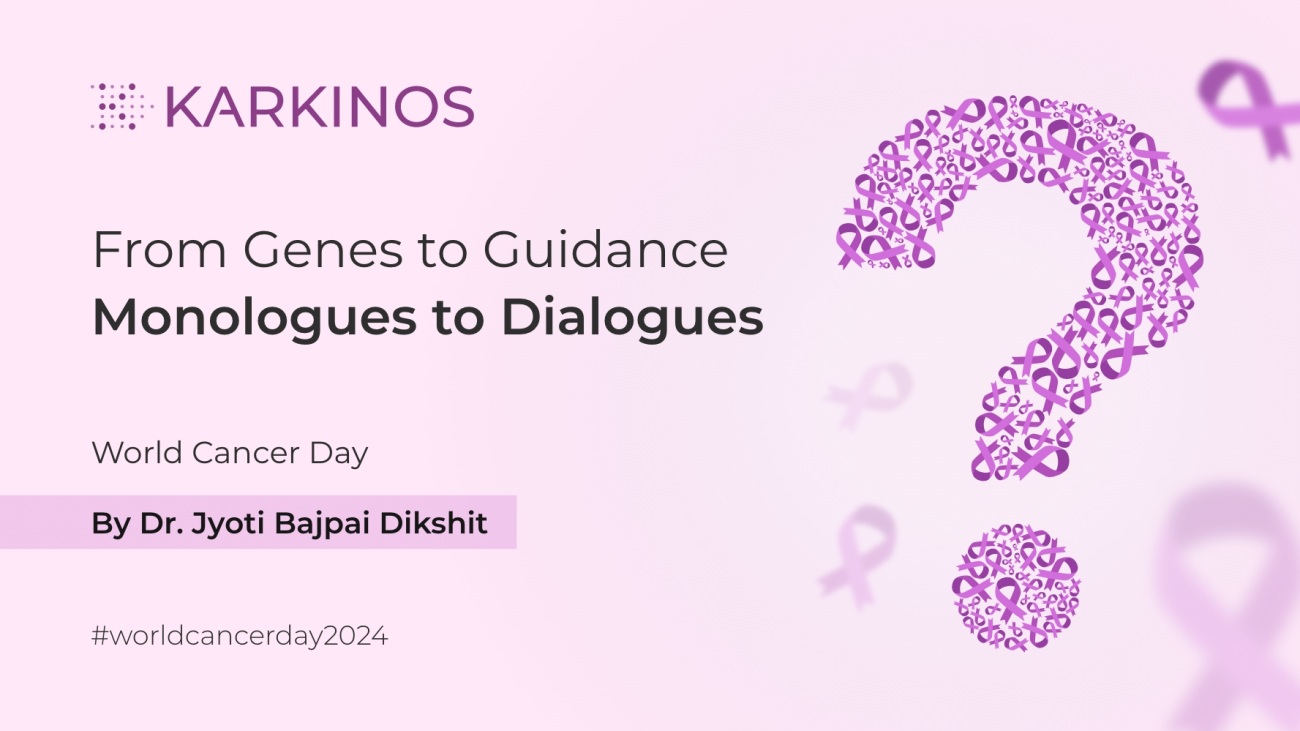Understanding the Role of Genetics in Cancer Development
Oncology: From Genes to Guidance
Episode-1: Monologues to Dialogues
By Dr. Jyoti Bajpai Dikshit, Genetic Counsellor – Diagnosis-BD & Marketing, Karkinos Healthcare
Would it not be a good idea to start a series of simple communications to understand what we do at Karkinos with respect to genomic profiling in cancer care?
Why not use the platform of K-Vani to have a bilateral conversation to understand the role of genes, genetic counseling, and genetic testing in cancer care.
In this first episode of the series – Oncology: From Genes to Guidance, let us start with the introductory opening monologues from my end.
Query-1: What is Oncology?
Response-1
Oncology is the branch of medicine dealing with various aspects of cancer care. From the point of view of an individual, the various aspects of cancer care include: prevention, diagnosis, treatment, and palliation.
Prevention: The actions taken to reduce the risk of developing cancer by means of lifestyle changes, vaccination, detection, screening, predisposition of cancer is known as prevention.
Diagnosis: The identification of the presence and type of the cancer, determination of the extent of cancer by means of medical history, physical examination, clinical examination, imaging tests, laboratory tests, biopsy, pathology tests, staging, molecular tests, and genetic tests in an individual is known as diagnosis.
Treatment: The medical interventions and therapies with an aim to control cancer cells in the body or eliminate cancer cells from the body is known as treatment of cancer. Common cancer treatment types include: surgery, chemotherapy, radiation therapy, immunotherapy, Hormone therapy, and targeted therapy.
Palliation: Palliative care is a specialized medical care with a focus to improve the quality of life for both the patient and their family by addressing the physical, emotional, social, and spiritual aspects of care. Palliative care may include pain management, symptom control, psychological support, decision making support, nutritional support, coordination support, spiritual support and at times hospice support.
Query-2: What is cancer?
Response-2
Cancer is a disease that involves the uncontrolled growth and spread of abnormal cells in the body. Normally, cells in the body grow, divide, and die in a controlled manner. However, in cancer, the abnormal cells grow and divide without stopping, forming tumors. Benign or normal tumors are not cancerous and do not spread in the body whereas malignant or harmful tumors are cancerous and grow in an uncontrolled fashion in the body.
Query-3: What is the role of genes and genetic alterations in cancer?
Response-3
Genes and genetics play a major role in cancers. Our human body is made up of cells, in cells we have nucleus; inside the nucleus, there are chromosomes, which contain genes. A gene is a segment of DNA.
DNA is composed of four nucleotide bases- adenine (A), thymine (T), cytosine (C), and guanine (G). The sequence of these bases in a gene encodes the genetic information.
We have more than 20,000 genes in the human body, which are collectively known as the human genome. There is a standard genetic code for the human genome, which is known as the reference human genome. Whenever there is a change in our genes with respect to this standard genetic code, it causes genetic disorders.
Cancer is one of the genetic disorders. The changes in the genes are known as genetic alterations or mutations.
Query-4: What are the types of genetic alterations?
Response-4
There are two main types of genetic changes related to cancers: Hereditary Changes and Somatic Changes.
In the first type, some individuals inherit genetic mutations from their parents that predispose them to hereditary cancers. These inherited mutations can increase the risk of developing hereditary cancer.
In the second type, the genetic changes occur in the DNA during an individual’s lifetime. These changes are known as somatic mutations. Somatic mutations can result from exposure to environmental factors, which can accumulate over time, and can contribute to the development of cancers.
Query-5: What is the role of genomic profiling in cancer care?
Response-5
In cancers, genomic profiling plays a vital role.
The first utility of genomic profiling is in planning the treatment of cancer patients. Each cancer is unique because of having a unique genomic profile. Personalized therapy, precision medicine or targeted therapy for cancers aim to tailor treatment approaches based on the unique genomic profile of an individual’s cancer.
Genomic profiling also provides the information about the inherited mutations. These mutations can be present in genes known as cancer susceptibility genes. Inherited mutations in these genes can increase the risk of developing certain types of cancer.
Query-6: What is genetic testing and how do we do it at Karkinos?
Response-6
The gene alterations or mutations are identified by genetic testing. Genetic testing involves examining the DNA and RNA of an individual and helps in revealing the changes in genes that may cause illness or disease and can also be helpful in treatment planning.
At Karkinos Healthcare, we follow the 4D model of Detection, Diagnosis, Delivery and Data with a mission to build and offer personalized cancer care solutions. Karkinos has the latest cutting edge Next Generation Sequencing Technology to perform genetic testing and render the unique genomic profiles of individuals for the predisposition, detection, prevention, diagnosis and treatment of the cancer patients.
Genetic testing involves analyzing an individual’s DNA and RNA to identify changes or mutations in genes. It is important for an individual to understand the requirement of genetic testing and the implications of genetic information obtained.
Query-7: What is genetic counseling and who is a genetic counselor?
Response-7
Genetic counseling is a process that involves providing individuals and families with information about the genetic aspects of various conditions. Genetic counselors help them understand and adapt to the medical, psychological, and familial implications of genetic contributions to disease and the treatment planning.
In the genetic testing process, genetic counseling plays an important role before the test is performed and also after the test results are reported by means of Pre-test Genetic Counseling and Post-test Genetic Counseling.
A genetic counselor plays a key role in making individuals and families understand the genetic components of various conditions and help them make informed decisions about genetic testing, risk assessment, and possible preventive measures.
Genetic counseling is provided by a certified genetic counselor, who has specialized education and training in genetic counseling.
Query-8: What is Pre-test Genetic Counseling?
Response-8
Pre-test genetic counseling is an essential part of the genetic testing process. Pre-test counseling educates individuals to understand the implications, pros and cons of genetic testing, as well as the potential impact of test results on their health, treatment and the health of their family members. During pre-test counseling, the genetic counselor also gathers the information about an individual’s personal and family history related to disease. During pre-test counseling, genetic counselors ensure that individuals fully understand the nature of genetic testing, including the purpose, potential outcomes, and any risks involved. Genetic counselors also take the informed consent from the individuals before undergoing any genetic testing.
Query-9: What is Post-test Genetic Counseling?
Response-9
After the results are reported, post-test genetic counseling is essential to ensure that the individuals have a comprehensive understanding of their genetic test results. Post-test genetic counseling helps the individuals to interpret the results; understand how the results can help in making informed decisions about medical management and treatment options; to explain the implications for family members to make informed decisions about their health. Post-test counseling is important for providing support, clarifying information, and addressing the broader implications of genetic testing results.
Query-10: What is the gist of the above monologues?
Response-10
In a nutshell, genetic counselors educate, support and help the individuals in making informed decisions by careful consideration of options and a thoughtful analysis of potential outcomes through pre-test and post-test genetic counselings.
At Karkinos, we want to ensure the accurate diagnosis, which is crucial for effective treatment. The cancer patients are substantially genetically diverse. Hence, it is important for the laboratories to go beyond mere diagnosis and offer evidence-based precision medicine tests that empower oncologists to determine personalized therapy for the patients.
Karkinos Healthcare has established the next-generation labs that comprehensively address societal needs in a unified facility to make such tests available, affordable and accessible.
Query-11: What is the next question from you?
Response-11
After my ten introductory monologues, I want to hear you out. Please write your queries to Anusha Ashwin – anusha.ashwin@karkinos.in. In the next episode, I will get back to you with the responses.

 Healthcare, has experience in bringing innovative genetic tests from bench side to bedside by creating awareness in the medical fraternity, among patients, and common persons.
Healthcare, has experience in bringing innovative genetic tests from bench side to bedside by creating awareness in the medical fraternity, among patients, and common persons.